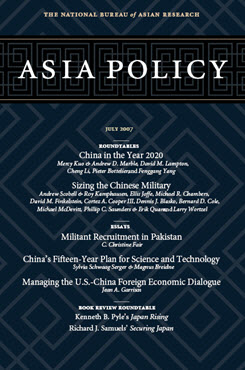Managing the U.S.-China Foreign Economic Dialogue
Building Greater Coordination and New Habits of Consultation
This essay attempts both to explain the sources and consequences of parochialism in U.S. foreign economic policymaking and to identify new bilateral dialogues with China that are creating deeper habits of consultation that may promote greater stability in the U.S.-China relationship.
EXECUTIVE SUMMARY
MAIN ARGUMENT
U.S. foreign economic policymaking in general—and toward China specifically—has been haphazard and uncoordinated, often reflecting competing policy efforts within the executive branch and between the president and Congress. Because various components of the U.S. bilateral dialogue with China are led by different bureaucracies, the parochial interests of these groups can create a policy shaped by narrow interests rather than one reflecting the overall needs of the economic relationship. New dialogues at the senior level, however—such as the Treasury Department’s Strategic Economic Dialogue and the State Department’s Senior Dialogue—offer a broader strategic focus under which to coordinate mid- and lower-level dialogues. This, in turn, may both provide a useful structure to coordinate U.S. policy interests and help shape China’s development, encouraging China to become a responsible stakeholder in regional and global affairs.
POLICY IMPLICATIONS
- If U.S. bureaucracies operate independently in various bilateral dialogues, without overall policy coordination, bureaucratic infighting rather than strategic imperatives will shape U.S. foreign policy priorities. In such an environment presidential prerogative in the making of foreign economic policy becomes more vulnerable to congressional and domestic critics.
- If regularized high- and low-level dialogues that focus on strategic issues rather than on specific deliverables are maintained, then these new habits of consultation can promote greater cooperation with China by providing a way to bring China to the table on sensitive subjects. Furthermore, placing current controversial dialogues within a broader framework brings policy framers and implementers from both sides to the table.
- If the State Department’s emerging role as coordinator and framer of foreign economic policy is maintained, then the U.S. government can make use of its ready expertise and broad orientation, which provides a strategic focus that links U.S. economic interests to other cross-cutting issues, as well as coordinate with the U.S. Embassy and consulates to facilitate implementation of U.S. policy goals within mainland China.
About Asia Policy
Asia Policy is a peer-reviewed scholarly journal presenting policy-relevant academic research on the Asia-Pacific that draws clear and concise conclusions useful to today’s policymakers. Asia Policy is published quarterly in January, April, July, and October and accepts submissions on a rolling basis. Learn more


